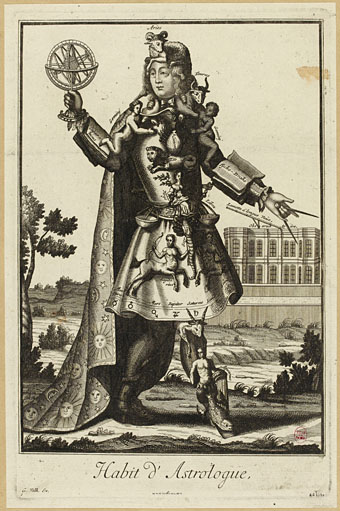Habit d’Astrologue (c. 1700) by Gerard Valck.
• “The Appointed Cloud begins with the high-pitched, keening sound of many bagpipes noisily playing at once—and then the music slowly coalesces, approaching a peaceful, tranquil hum. This gives way to fast-paced repetitive pulses, reminiscent of the minimalist works of composers such as Terry Riley and Philip Glass. Then the bagpipes join in once more, in a ferocious swarm of energy.” Geeta Dayal on the music of Yoshi Wada.
• “How can we conceive of the time of climate change, the time of planetary death? The House on the Borderland tried to conceive of exactly this a century ago. Yes, the narrator’s acts are fruitless. He gets haplessly carted about the universe to witness the end of time, which never really ends, is always at the edge, nearing an asymptote, on the borderland.” Namwali Serpell journeys through space and time with William Hope Hodgson.
• The Bureau of Lost Culture: DJ Food hosts a podcast discussion with Tony Bennett, founder and publisher of Knockabout Comics.
• Mixes of the week: Isolated Mix 111 (plus interview) by Ian Boddy, and a Wire mix (plus interview) by Teresa Winter.
• Fantastic visions and unknown worlds: Edwin Pouncey on Van Der Graaf Generator’s sleeve art.
• At Spoon & Tamago: Sculptor Kenichi Nakaya reconfigures ubiquitous Japanese rural crafts.
• My Bloody Valentine’s Kevin Shields: “We wanted to sound like a band killing their songs.”
• At Wormwoodiana: More earth mysteries are explored in Northern Earth magazine.
• New music: Black Horses Of The Sun by Dave Bessell.
• The Exotica Project: One Hundred Dreamland 45s
• At Dennis Cooper’s: Hans Richter Day.
• Mdou Moctar‘s favourite music.
• Earth Floor (1985) by Michael Brook | Earth Tribe (1993) by Transglobal Underground | Earth Lights (2012) by Belbury Poly


OMG William Hope Hodgson in the Paris Review! What’s happening? My head is spinning. What’s next? William Burroughs volumes in the Library of America?
During the pandemic lockdown I’ve been revisiting old favorites. I just recently finished rereading Wells after many years. It would be interesting to further explore the relationship between his work and Hodgson. The article also inspires me to dig out my copy of THOTB.
Always on the lookout for unknown writers of worth but a look at the online table of contents for ‘B-Side Books: Essays on Forgotten Favorites’ from which Serpell’s article is derived gives me pause. Surely these mainstream academics don’t imagine that they’ve “discovered” Stanislaw Lem or Shirley Jackson or Russel Hoban!
Heh, I was also surprised that Hodgson was appearing in the Paris Review. “Forgotten” in that book title seems like one of those silly attention-grabbing marketing phrases more than anything to do with the contents. Solaris and Riddley Walker can hardly be called forgotten when they’re the most well-known novels by those authors. And HOTB has been continually in print since 1969. Most authors alive today will be lucky to write anything with the longevity of Hodgson’s books.
I reread a lot of Wells myself a few years ago, and I’m fairly convinced that The Time Machine and Doctor Moreau were major influences on HOTB. The Time Machine obviously for journey through time and the scene at the end of the world (which also leads to The Night Land) but also the battles with the Morlocks. If you cross the Morlocks with some of Moreau’s hybrid ceatures you get the Swine-things snuffling around in the dark.